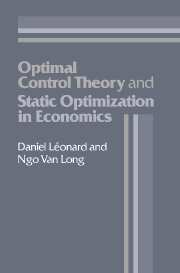Book contents
- Frontmatter
- Contents
- Preface
- 1 Static optimization
- 2 Ordinary differential equations
- 3 Introduction to dynamic optimization
- 4 The maximum principle
- 5 The calculus of variations and dynamic programming
- 6 The general constrained control problem
- 7 Endpoint constraints and transversality conditions
- 8 Discontinuities in the optimal controls
- 9 Infinite-horizon problems
- 10 Three special topics
- Bibliography
- Index
1 - Static optimization
Published online by Cambridge University Press: 05 June 2012
- Frontmatter
- Contents
- Preface
- 1 Static optimization
- 2 Ordinary differential equations
- 3 Introduction to dynamic optimization
- 4 The maximum principle
- 5 The calculus of variations and dynamic programming
- 6 The general constrained control problem
- 7 Endpoint constraints and transversality conditions
- 8 Discontinuities in the optimal controls
- 9 Infinite-horizon problems
- 10 Three special topics
- Bibliography
- Index
Summary
In this chapter we deal with problems involving the choice of values for a finite number of variables in order to maximize some objective. Sometimes the values the variables may take are unrestricted; at other times they are restricted by equality constraints and also by inequality constraints. In the course of the presentation an important class of functions will emerge; they are called concave functions and are closely associated with “nice” maximum problems. They will be encountered throughout this book. For this reason we weave the concept of concavity of functions through the exposition of maximization problems. This is done to suit our purposes, but concave functions have other important properties in their own right.
The notation we use is fairly standard. If in doubt, the reader should refer to the appendix to this chapter, which also contains a reminder of the basic notions of multivariate calculus and some matrix algebra needed to follow the exposition.
Unconstrained optimization, concave and convex functions
In what follows we assume all functions to have continuous second-order derivatives, unless otherwise stated. Strictly speaking, all domains of definitions should be open subsets of the multidimensional real space so that no boundary problems arise.
Unconstrained maximization
Consider the problem of finding a set of values x1, x2, …, xn to maximize the function f(x1,…,xn). We often write this as
where x is understood to be an n-dimensional vector. We refer to the problem of (1.1) as an unconstrained maximum because no restrictions are placed on x.
Information
- Type
- Chapter
- Information
- Publisher: Cambridge University PressPrint publication year: 1992
